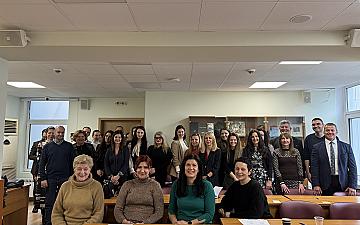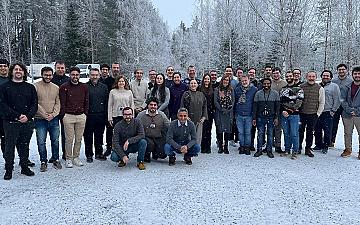The Bulgarian Judges and the New Challenges in Enforcing EU Competition Law
Projects / Completed
Period: February 2015 – September 2015
Status: Finished
Contacts: Prof. George Dimitrov, DSc
Description
Law and Internet Foundation was awarded a grant to implement the project ‘The Bulgarian Judges and the New Challenges in Enforcing EU Competition Law’ with the financial support of the European Commission under Justice Programme (2014 – 2020) under the call for proposals for training of national judges in EU Competition Law and judicial co-operation. The programme encompasses measures for public and private enforcement of competition rules and state aid. The project aims to ensure coherent and consistent application by national courts of the European competition rules and to improve and encourage the cooperation between national judges in the field of European competition law, including the application of cooperation mechanisms between national judges and national competition authorities.
With this project, Law and Internet Foundation builds on the results achieved within the ‘Strengthening the Capacity of the Bulgarian Judiciary in the Enforcement of EC Competition Rules’ project implemented in the period from December 2011 – June 2012 under ‘Civil Justice’ Programme (2007 – 2013). The present project builds on the established good practices and aims to ‘upgrade’ the competences of national judges in the field of competition law and consumer protection law enforcement.
The project encompasses the organisation of two training events for a total of 75 participants targeted at Bulgarian national judges.
- The first training event is a 2.5-day seminar devoted to providing theoretical and practical background on the latest developments in EU Competition Law. It deals, in particular, with the concepts of ‘market’ and ‘market power’, the current developments under Article 101 TFEU in general (Agreements, Decisions and Concerted Practices) and in light of ‘joint ventures’ when perceived as ‘concentrations’, the role and impact of the EC Merger Regulation 139/2004, the latest developments with reference to Article 102 TFEU (Abuse of Dominant Position) in light of the Guidance on enforcement priorities, as well as the concept of leverage of market power from one market to another
- Тhe second training event is a two-part training seminar with each part covering 2.5 days. The seminar focuses on the challenges national judges face in enforcing EU Competition Law from the perspective of the relationship between competition protection and consumer protection. The first part of the event would familiarise the national judges with the comparative aspects of competition and consumer protection from a legal perspective, the legal effect of the decisions of the national competition authorities, keeping trade secrets in competition law cases, converged models of competition and consumer protection authorities etc. The second part goes further to present consumer protection in the context of Article 102 TFEU. It also considers consumer class actions for competition damages and challenges in enforcing the EU rules in this respect and also addresses the potential implications of the recently adopted Directive on Antitrust Damages Actions. Considering the role of the national competition authorities (NCAs) in the process, the project also addresses a special topic on the enforcement of competition law by the NCAs, their cooperation with the EC in enforcing Articles 101 and 102 TFEU and, in particular, the legal effect of their decisions for the national court, competition law and consumer protection in electronic commerce, procedures for claiming incurred fees before the national court as well as the admissibility of indemnification claims against the state for invalidated decisions of the NCAs.
The first part of this event seeks to provide initial training on the basic concepts shaping this synergic area of law, whereas the second part is envisaged as an ‘upgrade’ training which goes into detail and considers in concreto specific issues identified in the limited court practice on the matter to date.
One of the strategic aims of the project is to ensure the endurance of its results through establishment of practices and mechanisms for maintaining the knowledge and skills of judges in the field. This project also paves the way towards developing a long-term cooperation programme with the National Institute of Justice on advanced training of national judges in EU Competition Law.
Events
- Training Seminar ‘Enforcement of Competition Law and the Challenges before the National Judge’ (Part II - Advanced Module) - Sofia
- Training Seminar ‘Enforcement of Competition Law and the Challenges before the National Judge’ (Part I - Basic Module) - Sofia
- Training Seminar 'New Developments in EU Competition Law' - Varna








